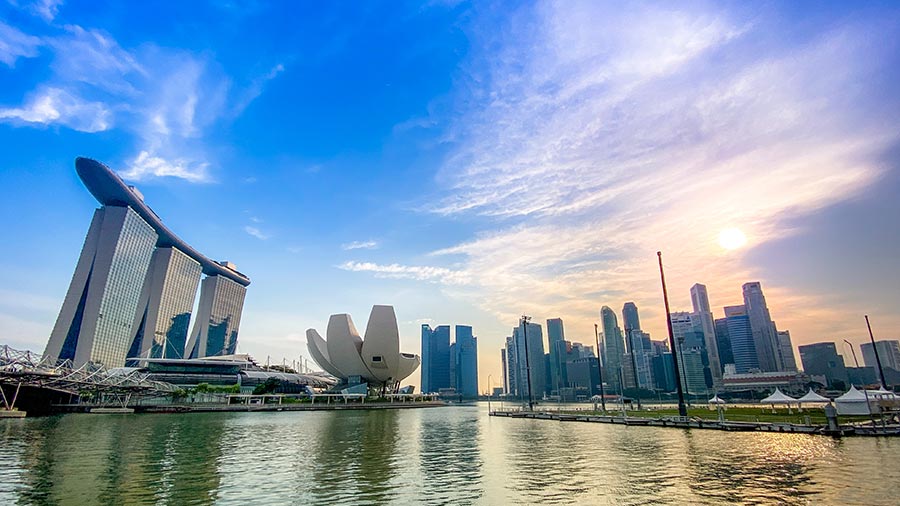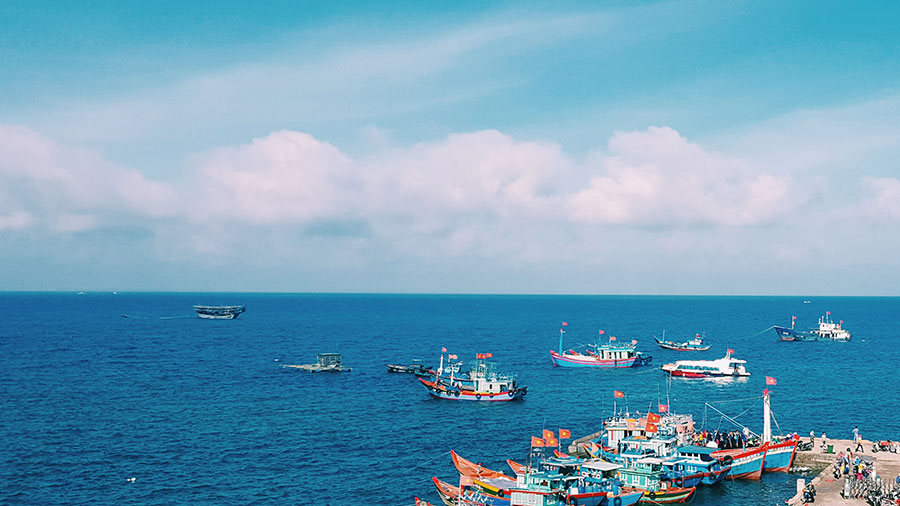The Gulf Cooperation Council and Singapore free trade agreement (GSFTA) came into force in 2013 and was Singapore’s second FTA in the middle east following the success of the Singapore-Jordan FTA in 2004.
Under the GSFTA, GCC countries and Singapore enjoy duty-free access to each other’s markets as well as reduced or eliminated tariffs on a large variety of goods and services. Since the inception of the FTA, trade between the GCC and Singapore continues to increase, reaching over US$43 billion over the past five years.
The FTA also offers increasing opportunities for businesses in the GCC to expand into ASEAN, a fast-growing economic bloc that is predicted to have the world’s fourth-largest GDP by 2030.
The Gulf Cooperation Council and Singapore free trade agreement (GSFTA ) was signed in Doha in 2008 before entering into force in 2013.
This FTA was a milestone agreement because it was the first FTA signed by the GCC and the second by Singapore in the middle east, following the Singapore-Jordan FTA in 2004.
The GSFTA allows GCC goods to have full duty-free access to the Singapore market while also qualifying 99 percent of Singaporean exports to the GCC tariff-free. Importantly, the GCC has recognized Singapore’s Halal Certification Standards which has enabled a greater selection of Singaporean Halal products to be exported to the bloc.
Over the past five years, Singapore’s bilateral trade with the GCC has grown to US$43.2 billion, the majority of which is dominated by Singapore’s oil imports from the bloc — the GCC supplies approximately one-third of Singapore’s oil imports.
What are the key clauses in the agreement?
Trade in goods
GCC-based businesses that import goods from Singapore can enjoy customs duty exemption, provided that they are in line with the conditions set in the GSFTA.
Trade in services
The GSFTA offers GCC suppliers enhanced business opportunities in Singapore for the following service sectors:
- Financial services;
- Tourism;
- Education;
- Construction and engineering-related services;
- Transport;
- Healthcare;
- Environmental services;
- Communication;
- Distribution; and
- Business services.
Qatar, Saudi Arabia, Bahrain, and the UAE have allowed up to 100 percent foreign equity for Singaporean legal companies. Oman has allowed 70 percent foreign equity under the GSFTA.
In the field of construction services, the UAE has allowed up to 70 percent foreign equity for Singaporean construction companies. However, if the projects exceed US$450 million, the foreign equity for Singaporean companies is increased to up to 100 percent. Qatar, Saudi Arabia, Kuwait, and Bahrain allow for up to 100 percent foreign equity for Singaporean construction companies.
For education services, Saudi Arabia, Qatar, Bahrain, and the UAE allow up to 100 percent foreign equity for Singaporean companies that provide educational services. Oman allows up to 100 percent foreign equity.
Rules of origin
The rules of origin clause under the GSFTA states that only goods originating from a GCC country or Singapore will qualify for the preferential tariff treatment under the FTA or have undergone sufficient production.
A good is considered to have undergone sufficient working or production in the territory of the party under the GSFTA if the good:
- Has at least 35 percent of its content originating from Singapore or the GCC; or
- Satisfies the specific rules of origin in Annex 3 of the FTA.
Dispute settlements
The GSFTA facilitates a comprehensive dispute settlement procedure that is subject to consultations, conciliation, and arbitration, just like in the World Trade Organization.
Why should GCC businesses establish in Singapore?
Access to ASEAN
Singapore has long been a preeminent destination for setting up a regional headquarter to pursue business opportunities across ASEAN and Asia.
ASEAN is one of the fastest-growing economic blocs in the world and is projected to have the fourth-largest economy by 2030. By then, domestic consumption is expected to double to US$4 trillion, and a population of over 700 million people and 575 million of which will be internet users. Over the next decade, ASEAN is also expected to add 140 million consumers.
Business-friendly policies
Singapore is globally renowned as a business-friendly destination that offers a stable socio-political environment, a free market economy, highly efficient infrastructure, and an attractive tax regime.
As such, a primary advantage of Singapore is its ability to act as a centerpiece for the holding and management of regional assets. Holding companies are a vital component of any international expansion strategy, and Singapore offers investors a stable environment from which to administer operations in more speculative markets in Asia. The city-state has already attracted more than 37,000 international companies and 7,000 multinational companies that utilize Singapore as their regional headquarters.
A strong free trade agreement network
Despite regional players maintaining strong FTA networks, they are not as extensive as Singapore’s. Due to these factors, the country will continue to be the default location for businesses seeking to expand into Southeast Asia and neighboring regions.
The country’s 14 bilateral and 13 regional FTAs include some of the largest combined trade agreements in the ASEAN-China, ASEAN-India, and ASEAN-Hong Kong trade blocs — providing Singapore-based businesses with access to preferential markets, free or reduced import tariffs, as well as enhanced intellectual property regulations.
There are two types of FTAs: bilateral (agreements between Singapore and a single trading partner) and regional (signed between Singapore and a group of trading partners).
Bilateral FTAs
- China-Singapore FTA (CSFTA);
- India-Singapore Comprehensive Economic Cooperation Agreement (CECA);
- Japan-Singapore Economic Partnership Agreement (JSEPA);
- Republic of Korea-Singapore FTA (KSFTA);
- New Zealand-Singapore Comprehensive Economic Partnership Agreement (ANZSCEP);
- Panama-Singapore FTA (PSFTA);
- Peru-Singapore FTA (PeSFTA);
- Singapore-Australia FTA (SAFTA);
- Singapore-Costa Rica FTA (SCRFTA);
- Singapore-Jordan FTA (SJFTA);
- Sri Lanka-Singapore FTA (SLSFTA);
- Turkey-Singapore FTA (TRSFTA);
- United States-Singapore FTA (USSFTA); and
- UK-Singapore FTA (UKSFTA).
Regional FTAs
- ASEAN-Australia-New Zealand Free Trade Area (AANZFTA);
- ASEAN-China Free Trade Area (ACFTA);
- ASEAN-Hong Kong, China Free Trade Area (AHKFTA);
- ASEAN-India Free Trade Area (AIFTA);
- ASEAN-Japan Comprehensive Economic Partnership (AJCEP);
- ASEAN-Republic of Korea Free Trade Area (AKFTA);
- ASEAN Free Trade Area (AFTA);
- Comprehensive and Progressive Agreement for Trans-Pacific Partnership (CPTPP);
- EFTA-Singapore FTA (ESFTA);
- Singapore-Eurasian Economic union (EAEUSFTA);
- Regional Comprehensive Economic Partnership (RCEP)
- GCC-Singapore FTA (GSFTA); and
- Trans-Pacific Strategic Economic Partnership (TPSEP).
Singapore’s corporate tax landscape
Singapore’s tax system is internationally recognized as efficient and competitive, which allows foreign investors to enjoy low tax rates and numerous tax incentives. The country operates a single-tier, territorial tax system, which means that foreign-sourced income would not face additional taxes in Singapore. There is also no capital gains tax and there is no tax on dividends. Singapore imposes corporate income tax (CIT) at a flat rate of 17 percent for both foreign and domestic companies, the lowest among all ASEAN member states.
An extensive double taxation agreement
Singapore has one of the world’s most extensive DTA networks, attracting international businesses from a multitude of conventional and nuanced industries. The country has signed over 90 DTAs, which comprise three types: comprehensive, limited, and exchange of information arrangements (EOIAs).
Ease of incorporation
Singapore’s efficient business environment is demonstrated by the ease with which foreign investors can incorporate a business in the country. Registering a company can take as little as one day provided all the files are in order.
The private company limited by shares, commonly known as a private limited company, is the most preferred type of entity among foreign investors in Singapore. This entity is the most flexible, advanced, and scalable type of business form. The minimum paid-up capital is at least S$1 (US$0.71).





















